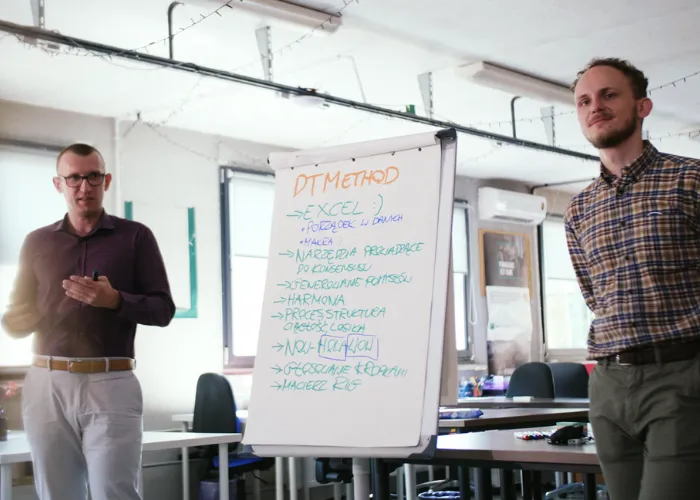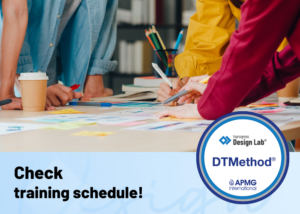Details
- 3 days
- english
- Accredited training
Addons
- Exam DTMethod® Foundation: 200 €
Training description
Design Thinking is a method which is gaining more and more recognition around the world. It serves to raise creativity levels while designing new products and processes with minimum costs incurred. Design Thinking is a tool which helps create innovations and improvements to existing products so that they can meet actual expectations of potential and end users. Additionally, it is one of the most reliable methods used during pre-project phase to assess whether it is cost-efficient to engage in the initiative and how the end product of the project should work to bring as many benefits to the organization as possible.
DTMethod is an APMG accredited Design Thinking methodology. It comprises a set of rules, guidelines and tools helping to restructure Design Thinking. Thanks to DTMethod the process, which is considered chaotic, is easier to predict and to implement within an organization.
The core elements of DTMethod are:
– DTRules&Roles – principles and roles required to use during the Design Thinking Process
– DTModel – a template of activities and a schedule which allows to realize the process goals
– DTTools – a verified set of tools which should be used in the Design Thinking Process
Implementing of DTMethod as a methodology to utilize all of the above.
How do we organise trainings?
Training takes place in two forms: onsite and online (live, real-time).
The training lasts 2 days. Standard training hours: 09-17.
Training goal
- Understanding what Design Thinking process is
- Learning DTTools, tools which enhance creative processes
- Understanding DTRules, the rules which needed to be followed to successfully realise a Design Thinking process within an organization
- Knowing DTRoles – the roles and responsibilities in the Design Thinking process
Benefits
Benefits to Individuals
- increased understanding of Design Thinking,
- learning about tools that can be used in troubleshooting,
- structuring knowledge about Design Thinking, reducing the sense of chaos,
- greater understanding and comfort of participating in Design Thinking processes.
Benefits to Organisations
Using the effective Design Thinking methodology will:
- increase the benefits obtained by products, processes and services created by project management processes preceded by Design Thinking,
- it massively reduces risk to organisations. They will know if a project is feasible before doing all the work,
- reduce the feeling of uncertainty about the duration and level of people’s involvement in the Design Thinking process,
- enable the incorporation of Design Thinking into the routine activity of projects,
- prepare employees for effective work during Design THinking workshops
- increase the efficiency of Design Thinking processes,
- increase the possibility of designing a good Solution.
Target group
- Project managers
- SCRUM masters
- Product Owners
- Project team members
- Sponsors
- Problem solvers
- Continuous improvement team members
- Top management and strategy organizers
- Trainers
- Facilitators
- Moderators
Certification
DTMethod® Foundation exam:
- Single-choice test consisting of 50 questions.
- To pass the exam it is required to obtain 65%, i.e. at least 33 points.
- The exam lasts 40 minutes.
- English language.
A participant who obtained the required number of points to pass the exam receives an international certificate in electronic. Additionally You can buy a paper version of the certificate.
DTMethod® Foundation Certificate is valid indefinitely.
Training programme
- Introduction to Design Thinking
- Introduction to DTMethod
- Workshops session 1: beginning DTMethod process and exploration phase
- Stakeholder research: interviews, questionnaires and observations
- Desk research
- Stakeholder research planning
- Workshops session 2: exploration phase
- Course of exploration phase; principles of DTMethod (DTRules) in exploration phase
- Workshops session 3: creative phase
- Course of creative phase; principles of DTMethod (DTRule) in creative phase
- Workshops session 4: construction phase
- DTMethod Foundation Sample Paper
- Workshops session 5: construction phase
- Course of construction phase; principles of DTMethod (DTRules) in creative phase
- Summary of DTMethod
- DTMethod Foundation Examination


